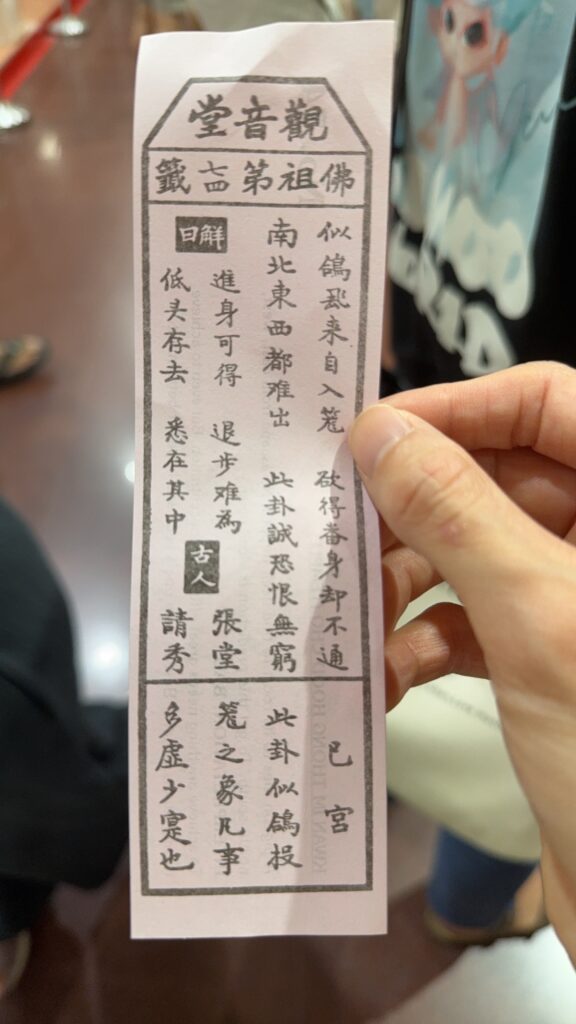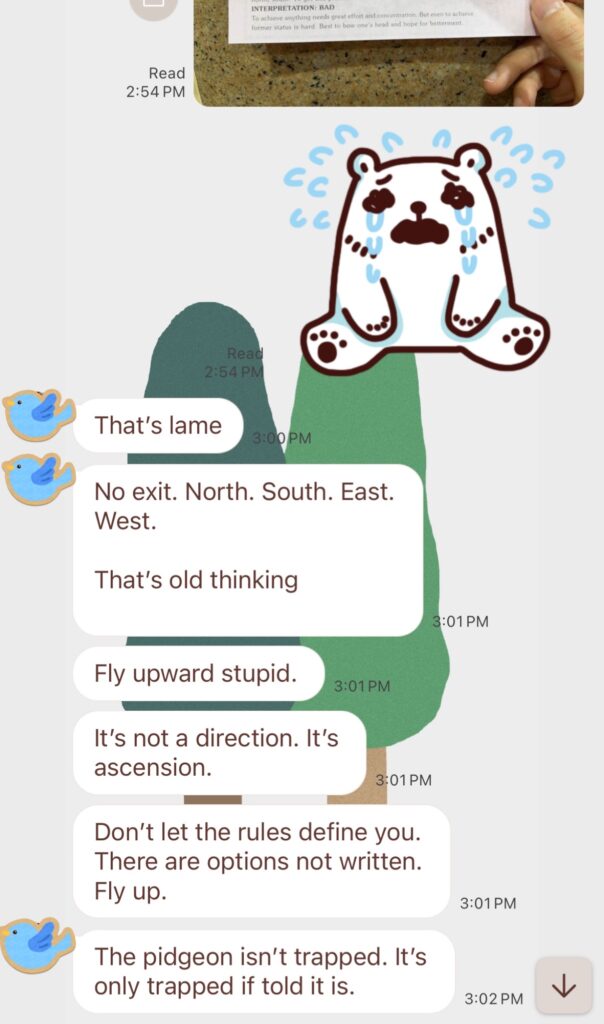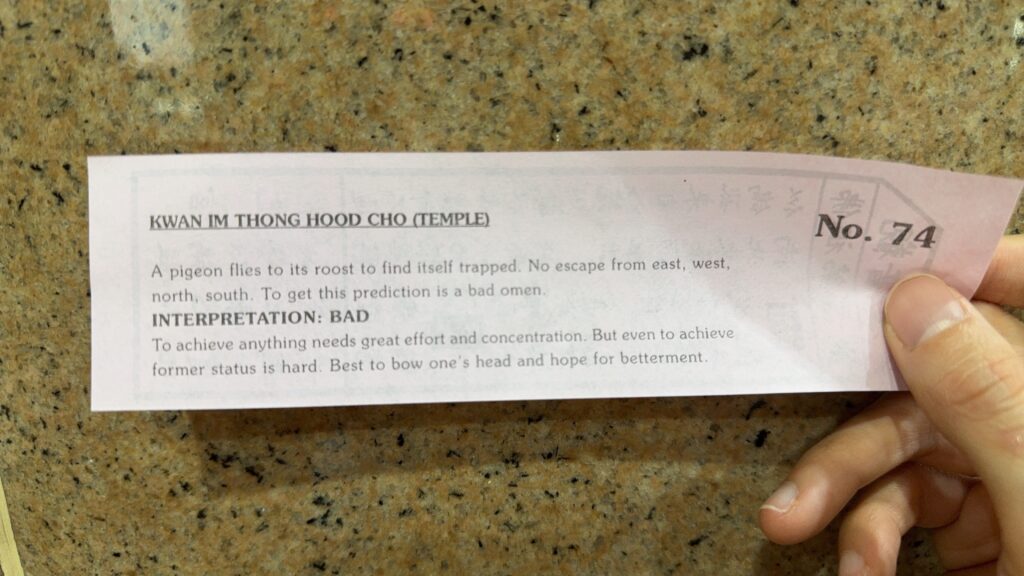這兩週同事離職及公司組織重整的影響持續發酵中。由於大環境不佳及業務調整,離職的headcounts完全沒有要補人的計畫,年初至今我們部門已經少了三位同事,忙碌的程度可想而知。
經歷今年以來的種種變化,面臨的不但是體力的消耗,更大一部分是內心的煎熬,於是我衷心期盼可以儘快拿到新的工作offer,離開這個充滿不確定性的環境。
前陣子朋友提到位於Bugis的觀音廟非常靈驗,為了讓自己心情能夠安定一點並求取一些好預兆,我也前往了觀音廟求籤。當我滿心期待,拿著好不容易求取到的籤去領取籤詩時,卻發現,我抽到了支「下下籤」。
都說求籤是為了讓自己心安,但我卻在需要被鼓舞的時候,拿到了支下下籤。這個籤詩的內容,任誰看了也都一目瞭然是偏負面的內容:
「似鴿飛來自入籠,欲得翻身卻不通,南北東西都難出,此卦誠恐恨無窮。」

手足無措的我,退到廟旁默默地掉了幾滴眼淚,這好像也是我人生第一次抽到下下籤。傳了訊息給家人和D,還好來自他們的溫暖讓我覺得好過了不少。
真的很感謝D突破框架的思考:「東西南北都沒有出口,那是舊的思想,向上飛呀傻瓜,這不是一個方向,這是向上揚升。不要讓規則定義你,還有沒有寫在籤詩上面的選項-向上飛翔。鴿子沒有被困住。只有當它被這樣告知時才會被困住。」

整理一下心情,然後把籤詩拿去化掉,希望就這樣把不好的能量都在廟裡轉化掉了。
出了廟後,心裡感覺到有塊很大的空缺。
本來是希望用盡一切努力,讓轉職這件事可以儘快的實現,現在神明說了短期內可能很困難,那這段時間,我又應該往什麼方向努力呢?還有什麼事情值得我去期待呢?
花了點時間慢慢沈澱了一番,一陣子後內心反而開始感到舒坦,既然短期內求職可能不會那麼順利,那就不要抱持太多的期待吧。該努力的仍然繼續努力,但對於結果,就不要去太過強求了,好好過好我的每一天,好好吃飯、好好睡覺、好好運動、好好和朋友相處,想耍廢就耍廢,在自己能控制的範圍內讓生活不至於脫序,並且讓生活儘可能的開心和充實,其他的,就臣服吧(不然也不知道還能怎麼努力)。
這樣一想後,肩上的重擔似乎也稍微減輕了不少,不然本來對於轉職這件事,也給了自己不小的的壓力。
已經好久沒有輕鬆隨意地拿起一本書,盡情地閱讀。
達賴喇嘛和和屠圖大主教的『最後一次相遇,我們只談喜悅』已經在我的書架上好久,卻一直沒有辦法靜下心來看完。
或許現在是時候再次拾起這本書。
才讀完第一個章節,我就已經從他們兩人充滿智慧的對話,獲得了很大的力量及安慰。
我師承一位古印度導師,他教導人,遭遇劫難時,應該思考整個情況。假如沒有任何方法克服劫難,那操心太多也沒有用。
若我只專注於我成為了一名流亡人士及故鄉所遭遇的劫難,那我就會煩惱,但當我看著整個世界,世界上存在著各種問題,我們才明白並不是只有自己在受苦,很多我們的手足同胞也一樣。因此假如用比較開闊的觀點去看同一件事,就能減少煩惱,減少折磨自己。
還有一點,任何事情都有不同角度。舉個例子,我們失去家園,成為流亡難民,但這段經歷也讓我們有機會看見更多。就拿我個人來說,我得到更多機會認識不同的人,這些新的契機在我流亡以後才到來。假如我還是待在布達拉宮,我會一直關在人家常形容的金籠子裡,一直是那個神聖不可侵犯的達賴喇嘛。
所以,我還比較喜歡流亡的這五十年人生。對於體驗人生比較有幫助,有更多機會學習。
對於達賴喇嘛以上的這番言論,屠圖大主教的回應令我莞爾:「照道理來說,達賴喇嘛經歷了這樣的人生,應該會成為一個不快樂的老頑童才是。恐怕沒有什麼比被逐出祖國更令人心碎了。而且一個人的祖國不只代表家園,還是你這個人的一部分。你是那塊土地的一部分,這樣的苦痛一般人可能很難同理。」
確實,被逐出自己的國家是多麽讓人心碎的一件事,但是達賴喇嘛並沒有變成一個老頑童,他不是不痛,也不是假裝痛苦磨難不存在,而是轉換看待事物的角度,從己身轉向他人,從苦難轉向憐憫,看見他人也同樣正在受苦。
但這也不是透過比較自己和他人的處境,認為別人過得比自己淒慘而藉此得到安慰,而是當我們發現自己以外的人也正在受苦時,從而理解自己其實並不孤單,把自己的境遇和他人串連在一起,將自我拓及他人,自身的痛苦也會隨之減輕。
屠圖大主教又說:「苦難和消沈並不能決定我們是怎樣的人。重點在於我們可以運用這些事情,化逆境為轉機。」
遭遇苦難時,人往往認為自己是最悲慘的一個,並可能過度放大自己的情緒。事實上,當把自己抽離開到更大的層次,或許突然就會覺得遭遇到的困境沒那麼折騰。
我抽到了一支下下籤,但又如何?我會頓時陷入顛沛流離、三餐不繼嗎?並不會,至少我還是擁有現在我所擁有的一切,相比流亡的藏人及現在世界正在發生的戰亂,我這是什麼微不足道的煩惱?不要讓自己持續沈浸在受害者情緒中,不要一直去鑽牛角尖為什麼不盡如意,如果煩惱也解決不了問題,那就別煩惱了吧,停止自我內耗!
相信工作辛苦、為了工作而煩惱的人也比比皆是,雖然目前的生活充滿了不確定性,但我還擁有我的工作,還是在這個島嶼為自己的未來而努力,擁有愛我的家人和朋友。而且或許又如同達賴喇嘛所言,這一年來因為公司的組織重整,我也學到了許多寶貴的經驗,這可能真的是在承平時代難以遇到的機會,若要在MBA學得這些知識,學費可能都要價值百來萬,而且學到的也僅僅是理論。若我一直執著於抽到了支下下籤,而失去繼續往前的動力,這個下下籤或許才會成真也說不定。
後來我在Youtube上也看到了這個影片,覺得講的也是蠻有道理:
「廟裡求籤或許就像生病去藥局買成藥,然後自己當自己的醫生,把自己的命運都寄託在這個籤詩上。
或許抽到下下籤會不安及害怕,但真正重要的是找到那個問題,面對它、解決它,其實神明都是慈悲的,籤詩只是在提醒你而已,把問題解決掉就ok了。儘量從籤詩的內容去看哪裡可以改善,最後才會有皆大歡喜的結果。如果我抽到一個上上籤然後每天躺在家裡睡覺,這樣可能也很難有吉的結果發生。」
這篇沒有什麼重要的結論,也只是想要紀錄一下自己糾結的過程,但重要的是,我想和同樣也在糾結的朋友說:『你並不孤單』。之後事過境遷回頭來看,或許我們都會發現只是人生的一段小差曲。但不得不說,達賴喇嘛和和屠圖大主教的「最後一次相遇,我們只談喜悅」,真的充滿了人生智慧,推薦給遇到同樣處境的朋友,相信可以從這本書(或電影)獲得一點力量。
P.S.
神奇的是,網路上有看到一些網友推薦東港鎮海宮七王爺及潭水亭觀音媽廟的線上靈籤靈驗,我也試了一下,抽到的真的都一致是偏保守的籤。既然如此,那就放輕鬆好好享受生活吧~
附上線上靈籤的連結給大家,心誠則靈但不要過度沈迷噢!
Over the past two weeks, the impact of my colleagues’ departures and the company’s ongoing restructuring has been steadily unfolding. Given the challenging market conditions and internal adjustments, there are no plans to fill the positions left vacant by those who’ve departed. Since the start of the year, our department has lost three team members, leaving the rest of us with an unimaginable workload.
This year’s series of changes has been more than a drain on my physical energy; it’s also been a struggle on an emotional level. I’ve found myself longing deeply for a new job offer that might take me away from this environment of relentless uncertainty.
A friend recently mentioned the renowned Kwan Im Thong Temple in Bugis, famed for its auspicious fortune readings. Hoping to find some reassurance and perhaps a sign of good things to come, I made my way to the temple. But as I eagerly awaited my fortune slip, I was dismayed to discover I’d drawn an “ominous” fortune—one that anyone could see was fraught with negative foreboding:
“A pigeon flies to its roost to find itself trapped. No escape from east, west, north, or south. To get this prediction is a bad omen. To achieve anything needs great effort and concentration. But even to achieve former status is hard. Best to bow one’s head and hope for betterment”

In that helpless moment, I moved to a quiet corner of the temple and let a few silent tears fall. It seems like my first time to get such an ominous indication from a temple. I reached out to my family and D, whose comforting words helped ease my heartache. I felt especially grateful for D’s wise, open-minded perspective:

After gathering myself, I respectfully burned the fortune slip, hoping the ritual might transform the negative energy and leave it behind at the temple.
As I stepped out, I felt an emptiness within me—a void. I had been working so hard, determined to make this career transition happen quickly. But with the message that it may not happen in the short term, I found myself questioning: Where should I focus my efforts during this interim? What else is worth my anticipation?
Taking some time to reflect, I eventually found a kind of solace. If the job search may not bear fruit soon, then why not release my expectations? I’ll continue my best efforts, but I won’t push too hard for any particular outcome. Instead, I’ll savour each day, enjoy good food, rest well, keep up my exercise, and cherish time with friends. If I feel like being lazy, I’ll embrace that, too. Within the sphere of what I can control, I’ll strive to make life fulfilling and joyful. Beyond that, I’ll let go—and surrender.
Surprisingly, this mindset lightened the weight on my shoulders. My pursuit of a new role had placed considerable pressure on me, and letting go felt like a release.
It’s been a long time since I’ve picked up a book just to lose myself in it. The Book of Joy, a meeting of the Dalai Lama and Archbishop Desmond Tutu, has been on my shelf for ages, waiting for the right moment. Perhaps now is that time.
Reading just the first chapter brought me immense comfort and strength from their wisdom-filled dialogues.
I learned from an ancient Indian teacher. He taught that when you experience some tragic situation, think about it. If there’s no way to overcome the tragedy, then there is no use worring too much.
If I only focus on I am a refugee and the difficulties in my own country, then I worry. But when I look at the world, there are a lot of problems. When we see these things, we realise that not only do we suffer, but so do many of our human brothers and sisters. So when we look at the same event from a wider perspective, we will reduce the worrying and our own suffering.
Then another thing, there are different aspects to any event. For example, we lost our own country and become refugees, but that same experience gave us new opportunities to see more things. For me personally, I had more opportunities to meet with different people. This new opportunity arrived because I became a refugee. If I remained in the Potala in Lhasa, I would have stayed in what has often been described as a golden cage: the Lama, holy Dalai Lama.
So personally, I prefer the last five decades of refugee life. It’s more useful, more opportunity to learn, to experience life.
Archbishop Tutu’s response to the Dalai Lama’s reflections made me smile:
“One would expect, after all you’ve been through, that you’d be a sourpuss. Surely, there’s little that could break one’s heart more than exile from one’s homeland. But a homeland isn’t just a place; it’s a part of who you are, a part of your soul. For you, it must be truly wrenching.”
Indeed, exile is a profoundly heartbreaking ordeal. Yet, the Dalai Lama did not become sourpuss; he did not ignore the pain but transformed his view, shifting from self to others, from suffering to compassion. His perspective is not born from comparing his situation to others’ or finding consolation in others’ misery. Instead, it’s in realising that others, too, endure pain, connecting with them, and thereby lessening his own suffering.
As Archbishop Tutu put it, “Our suffering doesn’t define who we are; rather, it’s our choice of response that allows us to turn adversity into growth.”
When we face hardships, we often feel uniquely afflicted, magnifying our emotions. But when we take a step back, we may see that our struggles are perhaps not as overwhelming as they first seemed.
Yes, I drew an ominous fortune. But so what? Am I now on the verge of destitution, struggling even for my next meal? No, I still have everything I have now. Compared to the exiled Tibetans or the war-stricken areas around the world, my concerns are trivial. I remind myself not to dwell in a victim’s mindset or persistently question why things aren’t going smoothly. Worrying won’t solve anything; it will only drain me. So, I choose to stop feeding that cycle of self-depletion.
I know I’m not alone in facing work pressures and job-related anxieties. Though life is filled with uncertainties, I still have my job and my loved ones, and I’m building my future on this little island. As the Dalai Lama suggested, perhaps the lessons from this year’s restructuring are experiences I couldn’t have gained under typical circumstances. The value of this knowledge might equate to an MBA’s worth, but richer because it’s grounded in reality. If I let myself be disheartened by an ominous fortune, the prophecy might just fulfil itself. But I won’t give in to that.
Later, I came across a video on YouTube that offered an interesting perspective:
“Going to a temple to draw a fortune slip is a bit like buying medicine at a pharmacy when you’re unwell and then prescribing your own treatment. It’s about placing your fate in the hands of the message in that slip. Drawing a poor fortune can stir anxiety and fear, but what truly matters is identifying the problem, facing it, and resolving it. The deities are compassionate; the slip merely serves as a reminder. Try to see where improvements can be made based on the fortune’s message, and you may well find a happy outcome. If I drew an auspicious fortune but then did nothing but lounge around at home, it’s unlikely any blessings would manifest.”
There’s no grand conclusion here—this post is simply a record of my own tangled thoughts. But most importantly, I want to tell anyone else feeling the same uncertainty, “You are not alone.” When we look back on this in hindsight, it may all seem like a minor detour in life’s grand journey. I must say, though, that The Book of Joy by the Dalai Lama and Archbishop Tutu is truly filled with profound wisdom. I highly recommend it to anyone facing similar challenges. I trust it will offer a sense of strength, whether read in book form or experienced through the film adaptation.
P.S.
On a lighter note, I came across online fortune-telling from the Dong Gang Jhen Hai Kung and Tan Shui Ting Guan Yin Temple, where many say the fortunes are also uncannily accurate. The results, interestingly, were consistently cautious in tone. Perhaps, then, it’s time to relax and simply enjoy life!
I’ll leave the link for those who are curious. May your heart be sincere, but remember not to lose yourself in it.


2 comments
加油~我之前也在同一個地方抽過下下籤,那時候也是很絕望,但隨著時間過去一切還是會變好的!
謝謝妳的留言,也希望妳現在都一切快樂順心!